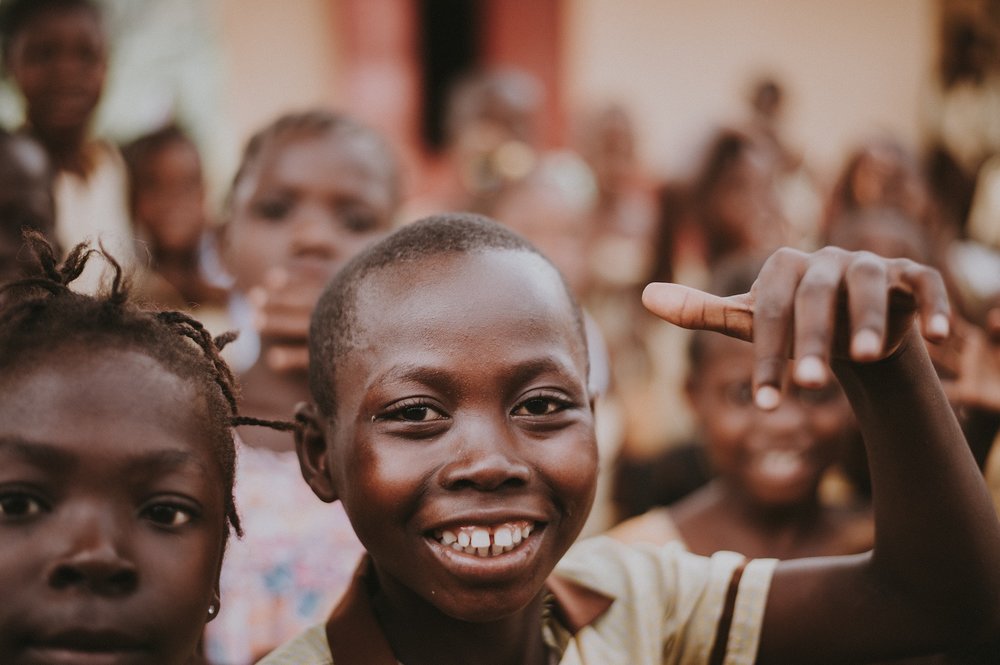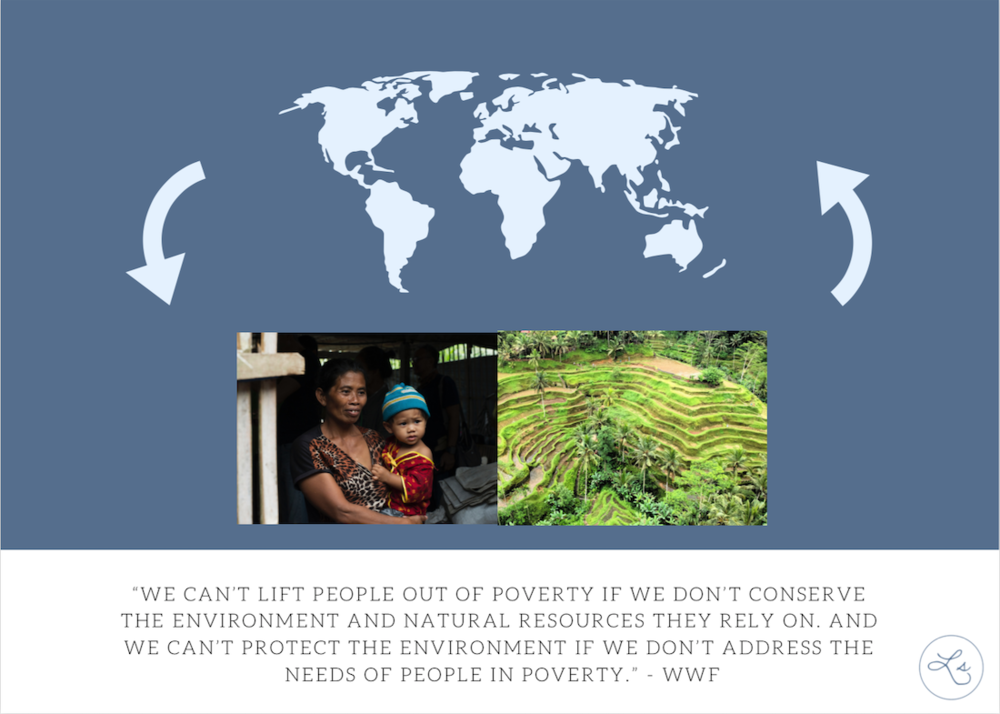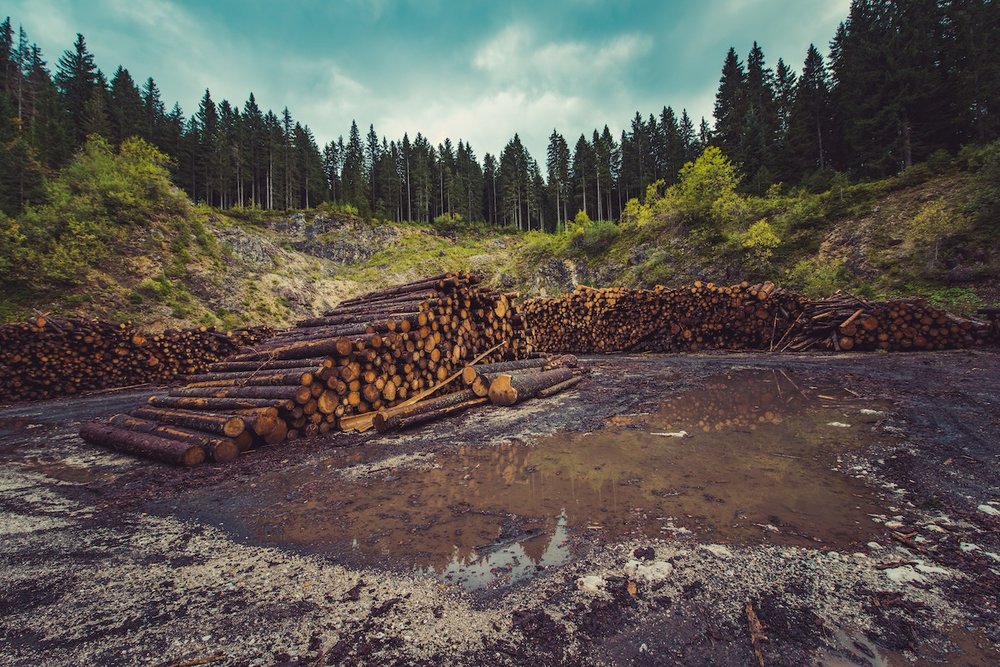Awhile back, I came across NASA astronaut, Mark Kelly’s, remarks about how he’s seen the earth visibly change from his view in outer space. After describing what he’s seen, such as the vastly visible deforestation of the Amazon Rainforest, he concluded, “As an astronaut, I’m often asked about the climate, our environment and how we are destroying the Earth. My response often surprises people. ‘Don’t worry about the planet, the Earth will be just fine’, I tell them. ‘What you need to worry about is us - all of us.’”
It wasn’t until I read this, that I started to think about our environment and the “global warming” controversy in a different light. Maybe it was his choice of words that really struck me - making me really think about how damaging our actions can be to the earth, and then how that directly affects humanity. Of course, I care about our world, but the environment wasn’t always top of mind for me like social issues were, until… he connected it back to people. As I dig into it, I’m learning more about how our world is interconnected, and how our actions, really do come back to affect us…good or bad. Call it karma, fate, science, God’s design, the truth is, our environmental actions are affecting all of us, and not only is it affecting the poor first, it’s affecting them worst.

Now, I realize the topic of our environment and “global warming” could be little controversial. I’ll be the first to say, I strongly dislike controversy. Debate is just not in my nature. I think it stems from my dislike of competition and my natural tug towards harmony. But, non-the-less, change isn’t sparked by sitting at home comfortably spewing out happy, light, topics we can all agree upon, now is it? While this is a topic that we might not all agree on, I think we’ll all be able to agree poverty and our environment are at least interrelated; and rather than making a hard-fast point, I hope what I’m about to write sparks thought-provoking questions that challenge us to think about our world and our collective future.

Poverty impacts the environment.
-
Due to lack of material resources and improper knowledge, people living in poverty tend to overuse the resources they do have around them. This leads to overexploitation of natural resources and deforestation. An example of this can be seen in the deforestation across the border of Haiti when compared to its neighboring country, the Dominican Republic.
-
Similar overuse of soil for growing crops leads to fragile land that doesn’t produce healthy yields.
-
Air and water pollution is common amongst the poor. Burning garbage releases carcinogens and gases, while open defecation leads to unsanitary living conditions. Kibera, an area of Nairobi, Kenya and the largest slum in Africa, houses 1 million people within 2 square kilometers. With no proper sanitation systems, human waste is thrown over the fence or into the river, impacting the environment and causing a windfall of health conditions.
“Poverty among people puts stress on the environment whereas environmental problems cause severe suffering to the poor.” - Niranjan Dev Bharadwaj, Voices of Youth

“It’s the poor who depend most on natural resources for their livelihoods, and who suffer most from the impacts of climate change, deforestation, overfishing and other environmental problems. Environment and development issues can’t be separated.” - WWF
The environment impacts poverty.
-
Because the materially poor rely heavily on the environment around them, when their environment becomes unusable, they experience immediate affects.
-
As soil is eroded and land degradation and deforestation take their toll, the ability to grow food declines, impacting health and the local economy.
-
Common natural disasters like floods and hurricanes drastically disadvantage the poor, leaving it difficult for them to combat the disaster and recover in the aftermath.
-
To exasperate this further, global warming brings with it erratic weather patterns and uneven distribution of rainfall - flooding and drought. This informative report by Unicef outlines the extremes in the weather global warming can create, affecting those who are most poor. According to this report, a water temperature rise of just 1 degree Celsius, can lead to a 5% increase in diarrhoea (bowel infection caused by bacteria) due to toxic algal blooms.
-
Flooding also often brings outbreaks of Cholera or an increase in vector-borne diseases like Dengue fever or Zika.
-
Since 2017, East Africa has been experiencing a hunger crisis like no other they’ve seen before due to severe drought. This very disturbing World Vision report documents images of people eating hyenas that make them sick and sucking bone marrow out of bones of dead donkeys (last updated May 2018). It’s almost too much to read! 😢
“Climate change affects us all, but it is the poorest and most disadvantaged who suffer the most.” - Unicef
According to Unicef, “The most flood and drought-prone regions are often in areas of extreme poverty where levels of access to water and sanitation are already low. This undermines the ability of children and their families to adapt to climate change and prepare for climate-related disasters.” It’s easy to see how this creates a repetitive downward cycle, and although this paints a rather dreary picture, there is a bright side to all this deforestation, climate change, poverty, and pollution. After all, this wouldn’t be a “Lovelight story” without considering the upside to a pressing problem, now would it? 😊
The power of choice rests in our hands.
-
Call it simple, but we can choose to do our small part in preserving the environment. Even choosing to run a little less water, turning out the lights, or recycling a bottle is a step in the right direction!
-
Choosing to continually work to end poverty, will help to curb the fiery cycle of poverty and environmental issues. And good news - Progress on the war on poverty is improving (amongst other things)! 19 Reasons to have hope in 2019, World Vision
-
With Earth Day coming up on April 22, now is a great time to “get in the spirit” and think about what our environment and its changes mean for our world - and very importantly, the world’s most materially poor.
Looking to support an organization in honor of Earth Day?
-
Organizations like World Wildlife Fund, help fight poverty while conserving our world’s natural assets. They help communities manage their natural resources and help local governments improve policies that encourage sustainability and thus, positively impact the poor.
-
Unicef’s WASH programs (Water, Sanitation, Hygiene) are reaching millions to improve sanitation for the materially poor and consequently, our environment.
Maybe you’re like me and hadn’t made a strong connection of the environment to the poor, or maybe you’ve already thought a lot about it! If you have, what thoughts have you concluded? If this is rather new, what possible realizations have you made? Or, in general, what thoughts are on your mind? I’d love to hear from you!

Note: This story is only focusing on the material side of poverty (one of many dimensions of life) and is in no way meant to paint a destitute picture of the materially poor. At the same time, we cannot turn away from the realities of poverty and environmental effects experienced by those living in material poverty. That’s what I hope this story sheds light on!
Such an important topic that is often not thoughtfully connected to poverty and the world’s most vulnerable. Great story!
Thank you, Chad! I agree, such an important topic and hopefully a new way to look at it. 🙂
The poor are always the most affected with environmental catastrophes. If we all do our part and make small changes in our lives like you’d suggested here we really can unite and make a difference! Thanks for sharing such a great blog post!
Thank you, Christine! Indeed, there are simple changes we can make, and if we all do so, we’ll have a big collective impact!